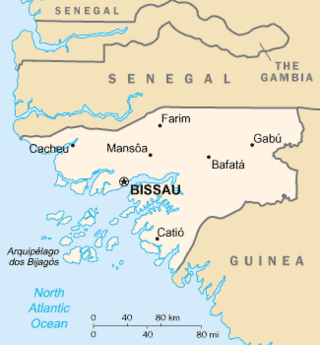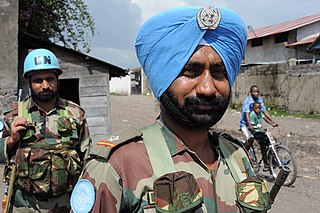
The Revolutionary Armed Forces of the People is the national military of Guinea-Bissau. It consists of an army, a navy, an air force, and paramilitary forces. The World Bank estimated that there were around 4,000 personnel in the armed forces. The estimated military expenditure are $23.3 million, and military spending as a percentage of GDP is 1.7%.

The United Nations Department of Political and Peacebuilding Affairs (DPPA) is a department of the Secretariat of the United Nations (UN) with responsibility for monitoring and assessing global political developments and advising and assisting the UN Secretary General and his envoys in the peaceful prevention and resolution of conflict around the world. The department manages field-based political missions in Africa, Central Asia, and the Middle East, and has been increasing its professional capacities in conflict mediation and preventive diplomacy. DPPA also oversees UN electoral assistance to Member States of the organization. Established in 1992, the department's responsibilities also include providing secretariat support to the UN Security Council and two standing committees created by the General Assembly concerning the Rights of the Palestinian People and Decolonization. DPPA is based at the UN Headquarters in New York City.

The United Nations Peacebuilding Support Office in Guinea-Bissau (UNOGBIS) was established by the United Nations Security Council in its Resolution 1233 in April 1999 to facilitate the general election and implementation of the Abuja Accord.

United Nations Security Council resolution 1216 was adopted unanimously on 21 December 1998. After expressing concern at the crisis and humanitarian situation in Guinea-Bissau, the Council called for the immediate establishment of a government of national unity in the National People's Assembly and the holding of elections by the end of March 1999.

United Nations Security Council resolution 1233, adopted unanimously on 6 April 1999, after reaffirming Resolution 1216 (1998) on the situation in Guinea-Bissau, the council established the United Nations Peacebuilding Support Office in Guinea-Bissau (UNOGBIS) to facilitate the implementation of the Abuja Accord.

United Nations Security Council Resolution 1925, adopted unanimously on May 28, 2010, after reaffirming previous resolutions on the situation in the Democratic Republic of the Congo, the Council extended the mandate of the United Nations Mission in the Democratic Republic of Congo (MONUC) until June 30, 2010, authorised a withdrawal of 2,000 troops and decided that from July 1, 2010, MONUC would be known as the United Nations Organization Stabilization Mission in the Democratic Republic of the Congo (MONUSCO) with a mandate until June 30, 2011.

United Nations Security Council Resolution 1941, adopted unanimously on September 29, 2010, after recalling all previous resolutions on the situation in Sierra Leone, particularly Resolution 1886 (2009), the Council extended the mandate of the United Nations Integrated Peacebuilding Office in Sierra Leone (UNIPSIL) until September 15, 2011.
United Nations Security Council Resolution 1943, adopted unanimously on October 13, 2010, after reaffirming all resolutions on the situation in Afghanistan and terrorism, including resolutions 1267 (1999), 1368 (2001), 1373 (2001), 1386 (2001), 1510 (2003), 1822 (2008), 1833 (2008), 1890 (2009), 1904 (2009) and 1917 (2010), the Council extended the authorisation of the International Security Assistance Force (ISAF) operating in the country for a period of one year.

United Nations Security Council resolution 1580, adopted unanimously on 22 December 2004, after reaffirming resolutions 1216 (1998) and 1233 (1999) on the situation in Guinea-Bissau, the Council extended the mandate of the United Nations Peacebuilding Support Office in Guinea-Bissau (UNOGBIS) for a further period of one year and revised its operations. It was the final Security Council resolution adopted in 2004.

The United Nations Integrated Peacebuilding Office in Guinea-Bissau (UNIOGBIS) is a United Nations peacebuilding mission in Guinea-Bissau.

United Nations Security Council Resolution 1959, adopted unanimously on December 16, 2010, after recalling resolutions 1719 (2006), 1791 (2007), 1858 (2008) and 1902 (2009), the Council established the United Nations Office in Burundi (BNUB) to replace the United Nations Integrated Office in Burundi (BINUB) as part of a scaled-down United Nations presence in the country for an initial period of twelve months, beginning January 1, 2011.

United Nations Security Council Resolution 1712, adopted unanimously on 29 September 2006, after recalling all previous resolutions on the situation in Liberia and West Africa, particularly resolutions 1509 (2003), 1667 (2006) and 1694 (2006), the Council extended the mandate of the United Nations Mission in Liberia (UNMIL) for six months until 31 March 2007.

United Nations Security Council Resolution 1719, adopted unanimously on October 25, 2006, after recalling resolutions on the situation in Burundi, including resolutions 1545 (2004), 1577 (2004), 1602 (2005), 1606 (2005), 1650 (2005) and 1692 (2006), the Council established the United Nations Integrated Office in Burundi (BINUB) for an initial period of one year to assist in the country's long-term peace and stability.

United Nations Security Council Resolution 1734, adopted unanimously on December 22, 2006, after recalling all previous resolutions on the situation in Sierra Leone, including resolutions 1620 (2005) and 1688 (2006), the Council renewed the mandate of the United Nations Integrated Office in Sierra Leone (UNIOSIL) until December 31, 2007.
United Nations Security Council Resolution 2005 was unanimously adopted on 14 September 2011.
United Nations Security Council Resolution 1886 was unanimously adopted on 15 September 2009.
United Nations Security Council Resolution 1876 was unanimously adopted on 26 June 2009.
United Nations Security Council Resolution 1829 was unanimously adopted on 4 August 2008.

United Nations Security Council Resolution 2030 was unanimously adopted on 21 December 2011 after recalling resolution 1949 (2010). The Council called on the Government and political stakeholders in Guinea-Bissau to work together to consolidate peace and stability, use legal and peaceful means to resolve differences and intensify efforts for genuine and inclusive political dialogue and national reconciliation.

On 12 April 2012, a coup d'état in Guinea-Bissau was staged by elements of the armed forces about two weeks before the second round of a presidential election between Carlos Gomes Júnior and Kumba Ialá. The coup started in the evening with military personnel and equipment making its way onto the streets, followed by the state-owned media being taken off-air.












